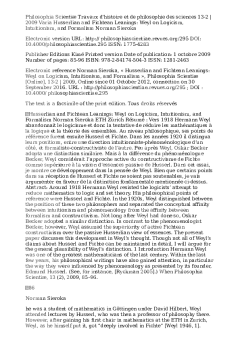Logicism intuitionism and formalism
Philosophia Scienti? Travaux d'histoire et de philosophie des sciences - Varia Husserlian and Fichtean Leanings Weyl on Logicism Intuitionism and Formalism Norman Sieroka Electronic version URL http philosophiascientiae revues org DOI philosophiascientiae ISSN - Publisher Editions Kimé Printed version Date of publication octobre Number of pages - ISBN - - - - ISSN - Electronic reference Norman Sieroka Husserlian and Fichtean Leanings Weyl on Logicism Intuitionism and Formalism ? Philosophia Scienti? Online - Online since October connection on September URL http philosophiascientiae revues org DOI philosophiascientiae The text is a facsimile of the print edition Tous droits réservés CHusserlian and Fichtean Leanings Weyl on Logicism Intuitionism and Formalism Norman Sieroka ETH Zürich Résumé Vers Hermann Weyl abandonnait le logicisme et donc la tentative de réduire les mathématiques à la logique et la théorie des ensembles Au niveau philosophique ses points de référence furent ensuite Husserl et Fichte Dans les années il distingua leurs positions entre une direction intuitionniste-phénoménologique d ? un côté et formaliste-constructiviste de l ? autre Peu après Weyl Oskar Becker adopta une distinction similaire Mais à la di ?érence du phénoménologue Becker Weyl considérait l ? approche active du constructivisme de Fichte comme supérieure à la vision d ? essences passive de Husserl Dans cet essai je montre ce développement dans la pensée de Weyl Bien que certains points dans sa réception de Husserl et Fichte ne soient pas soutenables je vais argumenter en faveur de la distinction fondamentale mentionnée ci-dessus Abstract Around Hermann Weyl resisted the logicists ? attempt to reduce mathematics to logic and set theory His philosophical points of reference were Husserl and Fichte In the s Weyl distinguished between the position of these two philosophers and separated the conceptual a ?nity between intuitionism and phenomenology from the a ?nity between formalism and constructivism Not long after Weyl had done so Oskar Becker adopted a similar distinction In contrast to the phenomenologist Becker however Weyl assumed the superiority of active Fichtean constructivism over the passive Husserlian view of essences The present paper discusses this development in Weyl ? s thought Though not all of Weyl ? s claims about Husserl and Fichte can be maintained in detail I will argue for the general plausibility of Weyl ? s distinction Introduction Hermann Weyl was one of the greatest mathematicians of the last century Within the last few years his philosophical writings have also gained attention in particular the way they were in uenced by phenomenology as presented by its founder Edmund Husserl See for instance Ryckman When Philosophia Scienti? ?? C Norman Sieroka he was a student of mathematics in G? ttingen under David Hilbert Weyl attended lectures by Husserl who was then a professor of philosophy there However after gaining his ?rst chair in mathematics at the ETH in Zurich Weyl as he himself put it got ??deeply involved in Fichte ? Weyl Translations throughout the paper are mine As further evidence of this involvement Weyl attended a reading group on Fichte Weyl and
Documents similaires










-
89
-
0
-
0
Licence et utilisation
Gratuit pour un usage personnel Aucune attribution requise- Détails
- Publié le Aoû 12, 2022
- Catégorie Philosophy / Philo...
- Langue French
- Taille du fichier 69.6kB


